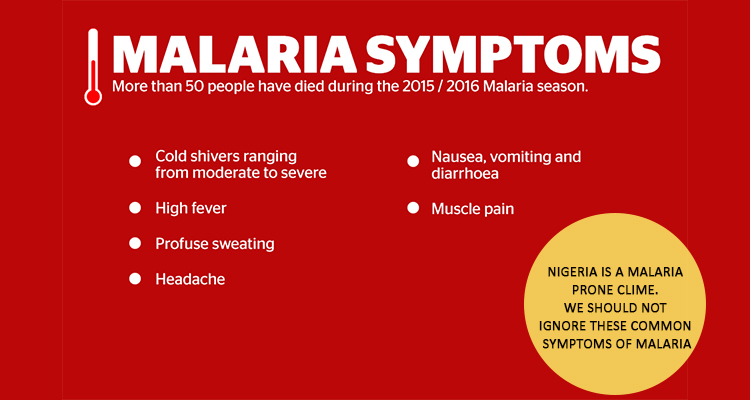Malaria is a life threatening disease that is typically transmitted through the bite of an infected Anopheles mosquito. When this mosquito bites it releases Plasmodium parasite into the body which then travels to the liver, where they mature and eventually enter the bloodstream. Malaria is mostly found in tropical and subtropical climates where the parasites can live. The World Health Organization (WHO) estimates about 3.2 billion people are at risk of malaria.
 The symptoms of malaria typically develop within 10 days to four weeks following the infection. Symptoms very in some people, some might start to show immediately and some might not develop for several months. More reason why we have to be very vigilant with our bodies and take note of even the slightest or littlest things that seem unusual.
The symptoms of malaria typically develop within 10 days to four weeks following the infection. Symptoms very in some people, some might start to show immediately and some might not develop for several months. More reason why we have to be very vigilant with our bodies and take note of even the slightest or littlest things that seem unusual.
Nigeria is a malaria prone clime and we should not ignore the following most common symptoms of malaria:
* Shaking chills that can range from moderate to severe
* High fever – With malaria, the patient develops a high fever, which comes and goes. The pattern of fevers may vary according to the species of malaria. However, there does not have to be a pattern to the fever. The fever may reach 107° F.
* Profuse sweating – which may occur for about 1 or 2 hours thereafter the fever gradually subsides.
* Headache – Headache may be a presenting feature of malaria. Sometimes the headache could be so intense that it may be mistaken for migraine, etc.

* Nausea – Uneasiness in the upper stomach and discomfort which might sometimes cause the need or the urge to vomit.
* Dizziness – Some patients may present with dizziness. There may also be vomiting and/or diarrhoea. Vomiting is very common in malaria and is due to high grade fever, the disease itself or even drugs. Vomiting may pose problems in administering antimalarial treatment.

* Muscle Pain – These symptoms are fairly common in malaria. Sometimes, malaria may present itself via general body ache, particularly in cases of recurrent malaria.
* Fatigue – Fatigue is common when down with malaria because of iron deficiency which happens when malaria parasites get to the blood. Tiredness is bound to happen.
Upon seeing these symptoms please visit your doctor to perform a physical exam and or blood test to enable for prompt, proper and adequate treatment of malaria. When malaria is diagnosed and treated effectively, a full recovery can be expected. Untreated malaria can cause severe anaemia and can quickly become life threatening.
Make sure to seek medical treatment immediately, before symptoms get worse, especially in children and pregnant mothers